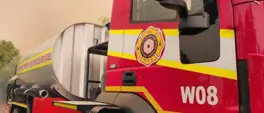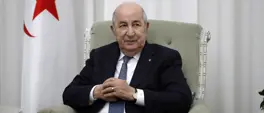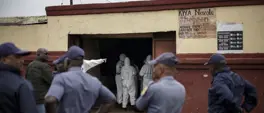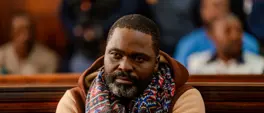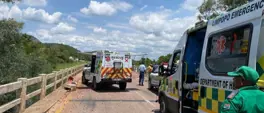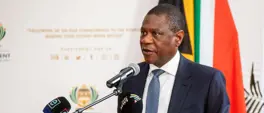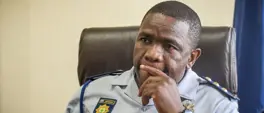Elections 2024: Political parties’ scrum for Gauteng takeover in face of ANC’s ‘vulnerability’
Vukile Dlwati
18 May 2024 | 10:00With election day less than two weeks away, Vukile Dlwati looks at the state of Gauteng - with over six million registered voters - and the heated contestation for the much-coveted takeover of the Provincial Legislature.
JOHANNESBURG - As political parties descend on Gauteng putting shoulder to wheel on their electioneering vehicles this week, the contestation is heated in South Africa’s smallest and most populous province.
Gauteng has over six million registered voters – the highest among the provinces.
Parties have upped the campaigning ante with the governing African National Congress (ANC) putting out all stops to stay in power.
Political analyst Lukhona Mnguni says the ANC’s vulnerability is laid bare in the province, considered the gateway into the African continent ahead of the highly contested polls.
The party has since roped in senior members including former statesmen Thabo Mbeki and Kgalema Motlanthe and former National Assembly Speaker Baleka Mbete to shore up its electioneering machinery.
“So, it tells you how vulnerable the ANC is, but also a spirited campaign that the ANC itself is putting out and pulling out and you know, recalling back into action, even some people we may have thought are retired politicians and tells you that Gauteng is going to be tightly contested,” he said.
Mnguni said the likelihood of the ANC losing its majority in Gauteng “is vast because the ANC won this province by 50.19% in 2019, which gave them 37 seats in a legislature of 73 seats at that time.”
The ANC is on “tenterhooks”, he said, adding that they understand how demoralised their voter base is in the province.
“It is evident in the fact that in the metros, you know, they no longer hold the majority, and the truth is that in Gauteng, over 75% of the registered voters are in the metros and not in the smaller municipalities.
“The ANC sees a potential for capitalising on some of the instabilities that have been seen in the metro coalitions.”
With a population of approximately 16 million, Gauteng boasts industrial advancement, the country’s capital city in Pretoria, the Johannesburg Stock Exchange (JSE) – which is the heart of the economic hub of Johannesburg, evident urbanisation and upward mobility – among others, political parties have their sleeves rolled up to win over the hearts of the electorate.
But the province is riddled with illegal mining, undocumented illegal migrants, ageing water infrastructure, inadequate water provision, high unemployment, ailing power infrastructure and, of course, rampant crime – among others.
LESUFI ON CRIME: ‘GAUTENG NEEDS MORE COPS’
The ANC provincial chairperson and Gauteng premier candidate Panyaza Lesufi’s foremost gripe is crime, which permeates every sphere of life in the country’s golden province. Criminal activity has adversely impacted the social well-being of the province's residents and ultimately its economy.
This has been Lesufi’s fight since becoming premier of the province. While crime remains uncontrollable under his watch, he is adamant that the ANC will secure an outright majority in the province.
Earlier in 2024, newly appointed Gauteng Police Commissioner Tommy Mthombeni revealed that murder and attempted murder increased by 3.8% and 9.4% respectively in Gauteng in the third quarter, while kidnapping spiked by almost 20%.
This week, Lesufi revealed on 702’s The Clement Manyathela Show that failure to halt crime would spell the end of his premiership.
“If there is one area that will make me to relinquish my responsibilities as a premier of this particular province is the issue of crime.”
Lesufi believes traditional ways of combating crime are old-fashioned, adding that “new technology, new innovation and new systems” are the way to go.
“I'm of the strong view that the methods that we are utilising, to police Gauteng, and by extension police, South Africa, they're not only outdated, but they're not moving with the times.”
He noted the province lacked sufficient police officers to meet the needs of the citizens saying a proposal was made to recruit 25,000 more.
“We presented our strategy and, unfortunately, were hit by legislative limitations.”
Lesufi said the provincial government has recruited 8,000 cops who are currently in training to safeguard people’s cars at events, hunt down drug lords, escort people to taxi ranks and school children studying overnight home – among others.
He said the cohort in training had the power to effect arrests and to be peace bearers.
“I don't think it's sufficient… you need them to have the firepower that they need.
“You need them to have the resources that they need to deal with crime in our province, but it's something that is a work in progress,” he said.
In a recent incident, which generated national outrage, a five-year-old boy, Ditebogo Junior Phalane, was shot and killed by hijackers outside his family home in Soshanguve. He had come out to welcome his father, whose vehicle was seized, home from work before his demise.
To this, Lesufi said he would seek a report from law enforcement agencies.
“We can't allow this kind of lawlessness to go unchallenged,” he said noting that no action would bring Phalane back to life.
GAUTENG PREMIER CANDIDATES HONE IN ON CRIME, ECONOMY, WATER WOES
Meanwhile, Economic Freedom Fighters (EFF) convenor of the Gauteng elections’ task force Mbuyiseni Ndlozi said he refused to believe that the police were completely compromised.
He was speaking to the media outside the Phalane home after the gunning down of the innocent boy.
“The hotspots of hijacking are known, the hotspots of murder are known, but you don’t have deployment in these areas. What are the police doing?”
“We are going to make sure that the case of Junior is part of the national agenda,” said Ndlozi.
The Patriotic Alliance (PA)’s deputy president and Gauteng premier candidate Kenny Kunene announced that the party had a R500,000 reward for anyone with information on the murder of the boy.
Solly Msimanga, the Democratic Alliance (DA)’s premier candidate, is capitalising on gangsterism in the province and the failure to obliterate it because it creates “unnecessary intimidation of businesses that provide much-needed jobs” – which manifests as criminal syndicates extorting protection fees from business owners.
Meanwhile, Rise Mzansi has confronted Hammanskraal’s longstanding water woes this week.
“We have to prioritise repairing the water infrastructure and as Rise Mzansi, we will focus on repairing water infrastructure, and ensuring that every single community, particularly, communities like this one in Hammaskraal, can get freely available access to water,” said Rise Mzansi’s premier candidate Vuyiswa Ramokgopa.
ActionSA premier candidate Funzi Ngobeni believes the quality of life for Gauteng residents is below par, touching on “a carefully thought-out strategy to ignite economic growth. This programme touches on four crucial areas: economic development and spatial planning, transport, roads and logistics, human settlements, and water and sanitation.”
Another political analyst, Sanusha Naidoo, acknowledged Guateng's pressure and challenges ahead of the polls, saying its biggest challenge will be getting an outright victory.
“In these elections, it is not business as usual for political parties. It’s about convincing voters to go and vote.”
At the same time, she believes the electorate is generally “confused” and they feel “abandoned”.
Considering that coalitions in Gauteng’s metros have been problematic, she asked: “Will people in Gauteng think about a coalition? We don’t know what people are going to do with their votes.”
She referred to people who, for instance, could vote for three different parties for each of the three ballots.
Naidu touched on Lesufi’s Nasi iSpani programme saying, “those are not substantive jobs”.
The much-criticised programme – introduced by Lesufi to tackle unemployment in the province - has employed over 30,000 people since June 2023.
“Eighteen and nineteen-year-olds are security guards - you’re putting their lives at risk,” said Naidu, adding that criminals are very brazen.
She said the Nasi iSpani recruits were vulnerable because hijackings, for example, happen everywhere. Naidu referred to the Phalane tragedy, which highlighted crime in the province.
“I am thinking more and more about where these hijackings are happening.”
CSDA RESEARCH DETERMINES PREDICTORS OF PARTY CHOICE AHEAD OF POLLS
This week, the Centre for Social Development Africa (CSDA) released research outcomes on factors influencing voter choice in South Africa’s national general elections.
According to the CSDA, socio-economic well-being and the fear of losing a grant no longer predict voters’ party choice.
The CSDA’s findings reveal some of the top predictors in 2024 “include perception of governance [trust in institutions], corruption, party loyalty, trust in party leaders and trust in the presidency of Cyril Ramaphosa."
The fate of the province is dependent on the electorate’s appetite for the type of candidate or party they believe is worthy of leading for the next five years.
Election day is set for 29 May 2024.
Get the whole picture 💡
Take a look at the topic timeline for all related articles.
Trending News
More in Politics

20 December 2025 06:26
SADTU sounds alarm: Rising student violence driving teachers out of the profession
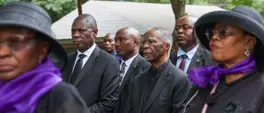
20 December 2025 06:07
‘South Africa is in serious problems’: Thabo Mbeki pays tribute to late advisor Titus Mafolo
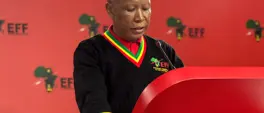
19 December 2025 15:16
EFF condemns US sanctions on ICC judges as a brazen attack on global justice

